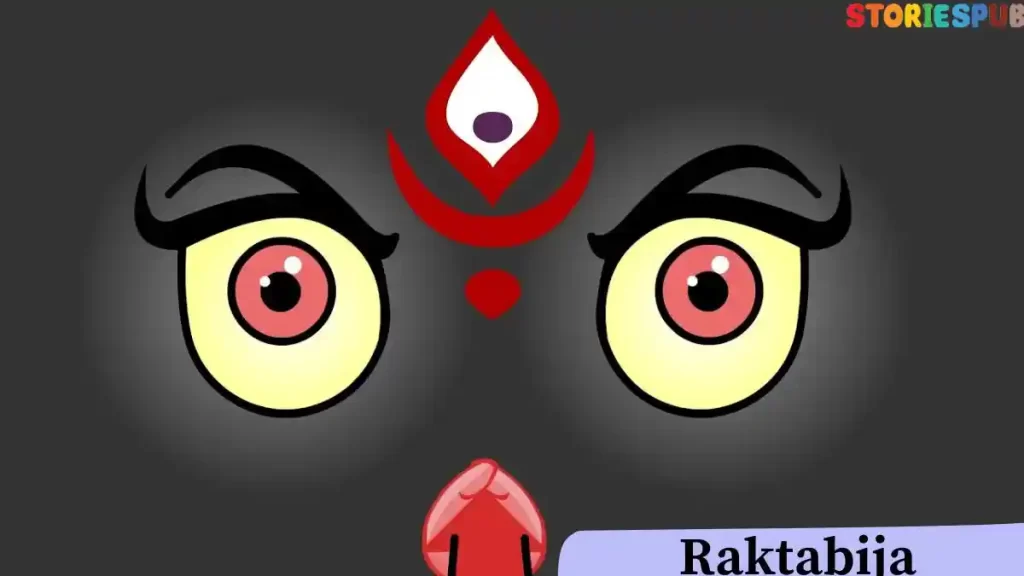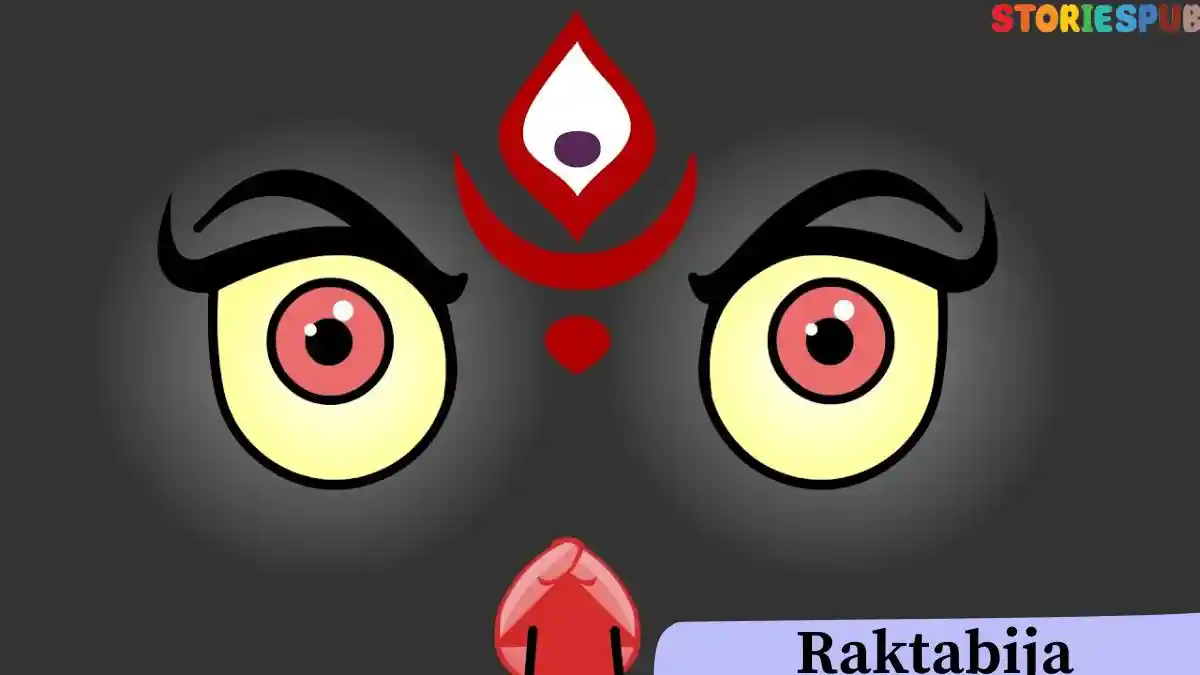Raktabija: The Fierce Battle of Kali & Durga Against Evil

In Hindu mythology, Raktabija was a formidable demon who struck fear into the hearts of gods and mortals alike. As part of the vast pantheon of supernatural beings, Raktabija represented the forces of chaos and destruction. Known for his unique ability to replicate himself from mere drops of his own blood, Raktabija became an almost insurmountable adversary. His story serves as a powerful reminder of the eternal struggle between good and evil and highlights the importance of unity and divine intervention in overcoming overwhelming odds.
Who was Raktabija
In Hindu mythology, Raktabija belonged to the Asura clan, a group of powerful beings who were often associated with chaos, darkness, and evil. He was born into a prominent demonic lineage that was known for their valor and combat skills. Raktabija’s family and ancestors had been locked in an eternal struggle with the Devas, the celestial beings representing light and good, vying for power and control over the universe.
As Raktabija grew older, he developed into a skilled warrior, mastering the use of various weapons and the art of combat. He was also deeply invested in spiritual practices, which further augmented his physical prowess. Inspired by the legends of his demonic predecessors, Raktabija sought to become the ultimate embodiment of power and might.
Determined to acquire invincibility and defeat the gods, Raktabija dedicated himself to rigorous penance and meditation, aiming to appease Lord Brahma, the god of creation. He endured extreme physical and mental hardships, remaining steadfast in his devotion. After many years of relentless austerity, Raktabija’s efforts were rewarded as Lord Brahma appeared before him, granting him a boon of his choice.
Cunningly, Raktabija requested the ability to create replicas of himself from each drop of his own blood that fell to the ground. Lord Brahma, bound by his promise, granted him the power, inadvertently setting the stage for a massive confrontation between the forces of good and evil. Raktabija’s newfound power made him a formidable threat, and the cosmic balance began to tilt in favor of the Asuras.
The gods, alarmed by Raktabija’s ever-increasing power, devised a plan to defeat him. They called upon Goddess Durga and her fierce avatar, Goddess Kali, to put an end to the seemingly unstoppable demon. Raktabija’s story eventually culminates in an epic battle, showcasing the immense power of the divine feminine and the ultimate triumph of good over evil.
The Emergence of Goddess Kali
As the relentless battle between Raktabija and the gods unfolded, it became increasingly evident that the demon’s unique power made him nearly impossible to defeat. With every drop of blood spilled, countless clones of Raktabija emerged, rendering the gods’ efforts futile. Desperate and exhausted, the gods turned to Goddess Durga, a powerful warrior goddess, embodying the divine feminine and revered for her boundless courage and strength.
During the fierce battle, Durga, mounted on her lion, struck Raktabija repeatedly with an array of weapons. Despite her immense power and ferocity, each strike only resulted in more clones of the demon. Realizing that the situation was escalating out of control, Durga decided to summon a formidable force to annihilate the seemingly invincible Raktabija.
In response to Durga’s intense determination, a burst of divine energy erupted from her forehead. From this immense surge of power, Goddess Kali emerged, a fierce and terrifying manifestation of the divine feminine. Kali, with her dark complexion, disheveled hair, and bloodshot eyes, struck fear into the hearts of all who beheld her. Adorned with a garland of severed heads and a skirt of severed arms, Kali brandished a deadly sword and a skull-topped staff. Her long, outstretched tongue was red and dripping with blood.
As Kali joined the battle, her relentless ferocity and immense power became evident. She tore through the ranks of Raktabija clones with ease, her mighty sword cutting down each of the demon’s replicas. Realizing that the spilled blood only led to more clones, Kali devised a strategy to counter Raktabija’s power. As she continued to strike the demons, Kali extended her tongue and began to drink up the blood before it could touch the ground. In doing so, she prevented the creation of any more Raktabija clones.
Goddess Kali systematically annihilated every replica of Raktabija, drinking their blood and leaving them no opportunity to regenerate. Finally, she confronted the original Raktabija, swiftly cutting him down and drinking his blood as well. With his unique power neutralized, Raktabija met his end at the hands of the fierce Goddess Kali.
The emergence of Goddess Kali played a crucial role in the defeat of the seemingly unbeatable Raktabija. Her ferocity, combined with Durga’s unwavering resolve, not only defeated the demon but also restored balance to the cosmos. Kali’s appearance in the story highlights the power of the divine feminine and the importance of determination and strategy in overcoming seemingly insurmountable odds.
The War between Raktabija and Goddess Kali
The war between Raktabija and the gods had reached a tipping point. Goddess Durga had just summoned her fierce and terrifying manifestation, Goddess Kali, to aid in the battle against the seemingly invincible demon. As Kali emerged from Durga’s divine energy, she let out a deafening roar that echoed across the battlefield.
Kali approached Raktabija, her eyes blazing with an indomitable fury, and challenged him, “Raktabija, your reign of terror and destruction ends today. The forces of good shall triumph over your wickedness!”
Unfazed, Raktabija sneered, “I am invincible, Kali! Countless gods have tried and failed to defeat me. What makes you think you can succeed where they have fallen?”
With a ferocious laugh, Kali replied, “I am unlike any foe you have ever faced, Raktabija. My strength knows no bounds, and my rage is insatiable. You may have fooled the other gods with your blood clones, but I am the embodiment of divine wrath, and I will put an end to your treachery!”
As the battle raged on, Kali tore through the hordes of Raktabija clones, annihilating each of them with her mighty sword. Realizing the futility of their attempts, the gods watched in awe as Kali displayed her unrelenting power and ferocity.
Raktabija, now visibly alarmed by Kali’s devastating onslaught, shouted defiantly, “You may have defeated my clones, but you will never conquer me!”
Kali, with blood dripping from her outstretched tongue, glared at the demon and bellowed, “Your arrogance blinds you, Raktabija. You may have been granted immense power, but that does not make you immortal. I shall drink your blood and leave no chance for your wickedness to spread further!”
With a swift and powerful stroke of her sword, Kali severed Raktabija’s head from his body. As the demon’s lifeless form crumbled to the ground, Kali drank his blood, ensuring that no more clones could be spawned.
As the dust settled on the battlefield, Kali and Durga stood victorious, with the other gods marveling at their indomitable strength and courage. The epic war between Raktabija and Goddess Kali marked the ultimate triumph of good over evil, demonstrating the incredible power of the divine feminine and the importance of unity and strategy in overcoming even the most insurmountable challenges.
The Significance of Raktabija’s Story and why it is Symbolism of good vs evil
The story of Raktabija holds significant importance in Hindu mythology, as it highlights various themes and symbolic aspects that are integral to the religion’s spiritual and moral framework. The narrative provides a vivid illustration of the eternal struggle between good and evil, emphasizing the ultimate triumph of righteousness over malevolence.
1. The Triumph of Good over Evil: Raktabija’s story represents a classic tale of good versus evil. Raktabija, a symbol of chaos and destruction, is pitted against the forces of light and order, represented by the gods and Goddess Durga. The battle against Raktabija and his clones is an allegory for the ongoing struggle between positive and negative forces within the world and within ourselves. It is a reminder that evil may appear insurmountable at times, but with courage, perseverance, and the divine’s intervention, good will always prevail in the end.
2. The Power of the Divine Feminine: The story of Raktabija places significant emphasis on the role of the divine feminine, as represented by Goddess Durga and Goddess Kali. These fierce warrior goddesses embody strength, courage, and wisdom, demonstrating that the divine feminine is equally capable of vanquishing evil and maintaining cosmic balance. The tale serves as a reminder of the importance of respecting and honoring feminine energy, which is essential for a harmonious and balanced existence.
3. Unity and Collaboration: The defeat of Raktabija also underscores the importance of unity and collaboration in overcoming challenges. The gods, unable to defeat Raktabija individually, join forces and seek help from the powerful Goddess Durga. Together, they form a united front against the demon, ultimately emerging victorious. This aspect of the story highlights the idea that working together as a collective is often more effective than attempting to face obstacles alone.
4. Resilience and Adaptability: The story of Raktabija also emphasizes the importance of resilience and adaptability in the face of adversity. When the gods realize that their conventional methods of fighting are ineffective against Raktabija, they adapt their approach by enlisting the help of Goddess Kali. Kali’s innovative strategy to prevent the demon’s blood from touching the ground is a testament to the power of adaptability and perseverance in overcoming seemingly impossible challenges.
5. The Moral Consequences of Power: Raktabija’s story serves as a cautionary tale about the moral consequences of power. Raktabija’s invincibility, granted by Lord Brahma, leads to an inflated sense of arrogance and a misguided belief that he is untouchable. This arrogance ultimately leads to his downfall, as it blinds him to the possibility of defeat. The narrative reminds us that power should be wielded responsibly and with humility, as unchecked power can lead to devastating consequences.
The significance of Raktabija’s story in Hindu mythology lies in its multifaceted exploration of the eternal struggle between good and evil, the power of the divine feminine, the importance of unity and collaboration, resilience in the face of adversity, and the moral consequences of power. These themes and symbolic elements continue to resonate with audiences, making the tale an enduring and essential part of Hindu mythology.
The power of the divine Durga and Kali
Goddess Durga and Goddess Kali are two of the most revered and powerful deities in Hindu mythology, representing different aspects of the divine feminine energy. Each goddess embodies unique qualities, yet both are revered for their strength, ferocity, and ability to vanquish evil.
Goddess Durga:
Warrior Goddess: Durga is often portrayed as a fierce warrior goddess, with eight or ten arms, each carrying a weapon symbolizing divine power. She is typically depicted riding a lion or a tiger, symbolizing her mastery over power, will, and determination. Durga is considered the ultimate protector and guardian of righteousness, defending her devotees from evil and ensuring the triumph of good over evil.
Supreme Power: Goddess Durga is believed to be the embodiment of Shakti, the supreme cosmic power and the divine feminine energy that pervades the universe. She is considered the source of all creation, as well as the force that sustains and ultimately destroys it, representing the cycle of life, death, and rebirth.
Wisdom and Intellect: Apart from her warrior aspect, Durga is also revered as the goddess of knowledge and wisdom. She is associated with the pursuit of learning and the development of intellect, guiding her devotees in their quest for knowledge and spiritual growth.
Goddess Kali:
Fierce and Fearless: Goddess Kali, an avatar of Goddess Durga, is often depicted as a fierce and terrifying figure, with dark complexion, disheveled hair, and a blood-soaked tongue. She represents the darker and more fearsome aspects of the divine feminine, unafraid to face and conquer the forces of chaos, destruction, and evil.
Destroyer of Demons: Kali is particularly known for her role in the annihilation of demons, embodying the raw power and ferocity required to destroy the forces of darkness. She is considered a fearless and relentless destroyer of evil, demonstrating the capacity of the divine feminine to protect and restore balance in the world.
Liberation and Transformation: Kali is also associated with liberation and transformation, as she represents the power to break free from the bonds of illusion, ignorance, and ego. Her destructive power is seen as a necessary force for the elimination of negative elements, allowing space for spiritual growth, transformation, and the realization of one’s true nature.
Both Goddess Durga and Goddess Kali exemplify the power of the divine feminine, representing the essential forces of protection, strength, wisdom, and transformation. They are seen as potent forces in the battle against evil, and their stories highlight the importance of embracing the many facets of the divine feminine in the quest for balance, harmony, and spiritual growth.
Lessons from the Story
The story of Raktabija offers several important lessons that can be applied to various aspects of life, reinforcing the spiritual and moral values in Hindu mythology. Here are some key lessons that can be learned from this epic tale:
The Triumph of Good over Evil: The story of Raktabija emphasizes that, despite seemingly insurmountable odds, good will ultimately triumph over evil. It serves as a reminder to maintain hope, faith, and perseverance in the face of adversity, as righteousness will ultimately prevail.
The Power of Unity and Collaboration: The tale teaches the importance of working together in order to overcome challenges. The gods join forces and seek the help of Goddess Durga, who in turn calls upon Goddess Kali, to vanquish the powerful demon. This highlights the idea that collaboration and unity can be more effective in overcoming obstacles than trying to tackle them individually.
Adaptability and Resilience: The story of Raktabija demonstrates the value of being adaptable and resilient in the face of adversity. The gods realize that their traditional methods are ineffective against the demon, so they adjust their approach by seeking the help of Goddess Kali. The ability to adapt and persist in challenging situations is a crucial lesson that can be applied to various aspects of life.
The Importance of Humility: Raktabija’s arrogance and overconfidence in his power ultimately lead to his downfall. This serves as a reminder of the importance of remaining humble and recognizing one’s limitations, even in the face of great power or success.
Respect for the Divine Feminine: The story highlights the strength and power of the divine feminine, as represented by Goddess Durga and Goddess Kali. It teaches the importance of respecting and honoring feminine energy, which is essential for achieving balance and harmony in life.
Embrace Change and Transformation: The story of Raktabija teaches us to embrace change and transformation, as represented by the role of Goddess Kali. Kali’s destructive power, while terrifying, is also a necessary force for the elimination of negative elements and the creation of space for growth and transformation.
Spiritual Growth and Inner Strength: The story serves as an inspiration to cultivate inner strength and spiritual growth, as demonstrated by the unwavering resolve of Goddess Durga and the fierce determination of Goddess Kali. It encourages the pursuit of self-realization and the development of inner resources to overcome challenges and obstacles.
The story of Raktabija offers valuable lessons about the triumph of good over evil, the power of unity and collaboration, adaptability, humility, respect for the divine feminine, embracing change and transformation, and the importance of spiritual growth and inner strength. These lessons continue to resonate with audiences, making the tale an enduring and essential part of Hindu mythology.
Hey kids, how much did you like The Raktabija: The Fierce Battle of Kali & Durga Against Evil? Please share your view in the comment box. Also, please share this story with your friends on social media so they can also enjoy it, and for more such Hindu Mythology, , please bookmark storiespub.com.
Check out other stories that we have:





